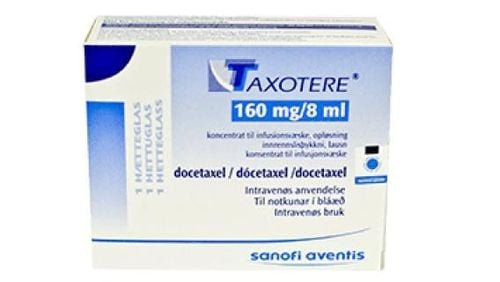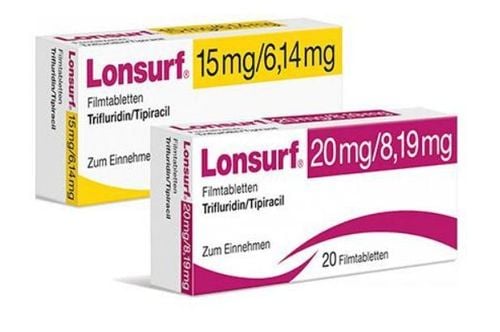This is an automatically translated article.
Nivolumab is a brand-name drug used to treat certain types of cancer, such as melanoma, lung cancer, malignant pleural mesothelioma, renal cell carcinoma, Hodgkin lymphoma, and cancer. head and neck, carcinoma, colon cancer, esophageal squamous cell carcinoma, liver cancer, stomach cancer.1. What is Nivolumab?
Nivolumab also known as Opdivo is a medicine used to treat cancer. Nivolumab's mechanism of action is as follows: T cells have the function of protecting our body from cancer by killing cancer-causing cell types. However, cancer cells have the ability to self-grow and form proteins that help cancer cells protect themselves from T-cells. Nivolumab works by blocking those protective proteins and helping T-cells can kill cancer cells2. Uses of Nivolumab
When using nivolumab in combination with certain chemotherapy drugs, it can be used to treat advanced or metastatic gastric cancer, esophageal junction cancer, and adenocarcinoma of the esophagus. Esophageal adenocarcinoma. Hepatocellular carcinoma. Non-small cell lung cancer that has metastasized or grown. Recurrent or metastatic squamous cell carcinoma of the head and neck with disease progression on or after platinum-based therapy. Advanced renal cell carcinoma with anti-angiogenic therapy. Hodgkin Lymphoma: Nivolumab specializes in the treatment of classical Hodgkin lymphoma that has relapsed or progressed following autologous hematopoietic stem cell transplantation and brentuximab vedotin, or after 3 lines of systemic therapy. In 2020, the US Food and Drug Administration (FDA) announced that the combination of nivolumab with ipilimumab can be used to treat malignant pleural mesothelioma (MPM) that cannot be removed by surgery. in adults. Treatment of locally advanced or distant metastatic transitional epithelial bladder cancer following platinum-containing chemotherapy, or disease progression within 12 months of adjuvant chemotherapy containing Platinum group. Unstable colorectal cancer (MSI-H) or colorectal cancer (dMMR): Use alone or in combination with pilimumab, for adults and pediatric patients 12 years of age and older who have progressed after treatment with fluoropyrimidine, oxaliplatin and irinotecan Treatment of difficult to detect or metastatic melanoma. Treatment of melanoma with lymph node involvement or metastatic disease that has been completely resected. Treatment of unresectable or metastatic melanoma in this case can be used in combination with nivolumab alone or in combination with ipilimumab.3. Side effects
The most common side effects when used in combination with chemotherapy include peripheral neuropathy (damage to the nerves outside the brain and spinal cord). Some of the most common side effects include:Body fatigue, weakness, musculoskeletal and joint pain, back pain, rash, itching. Abdominal pain, diarrhea, nausea, cough, shortness of breath, constipation, Decreased appetite. Respiratory tract infection, fever, headache. There is currently no scientific evidence that the use of the drug during pregnancy can harm an unborn baby or harm a nursing woman. However, doctors still recommend not to use Nivolumab for the above cases. Some more serious side effects that the drug can cause Nivolumab:
Right on the drug label, there is a warning to users when using Nivolumab can increase the risk of pneumonia, colitis, affect function liver and kidney dysfunction, hypothyroidism and hyperthyroidism. The degree of hypothyroidism can be up to 8.5% and the rate of hyperthyroidism is 3.7%. Diabetes or type 1 diabetes may also occur in about 2% of people treated with nivolumab.
Rare side effects:
In melanoma treatment trials, the following side effects occurred less frequently, only about 10% of users such as: Skin rash and itching, cough, infection upper respiratory tract and peripheral edema. However, this symptom occurs more often in cases of chemotherapy. Other clinical adverse events with a lesser frequency, approximately 10%, were the following symptoms: Arrhythmia, eye problems (iridocyclitis), infusion-related reactions, dizziness, Peripheral neuropathy, peeling skin, erythema multiforme, vitiligo and psoriasis . Electrolyte levels and blood cell counts are also disrupted.
4. Drug interactions
Drug interactions can change the drug's ability to work or increase the effect of side effects such as: Diethylstilbestrol, Chlorotrianisene, Conjugated estrogens, Ethinylestradiol, Estrone sulfate, Dienestrol, Estrone,...So before using If you are taking Nivolumab, tell your doctor about all the medicines you are taking, including supplements, prescription and over-the-counter medicines.
Vinmec International General Hospital is one of the hospitals that not only ensures professional quality with a team of leading doctors, modern equipment and technology, but also stands out for its examination and consulting services. and comprehensive, professional medical treatment; civilized, polite, safe and sterile medical examination and treatment space.
Please dial HOTLINE for more information or register for an appointment HERE. Download MyVinmec app to make appointments faster and to manage your bookings easily.













